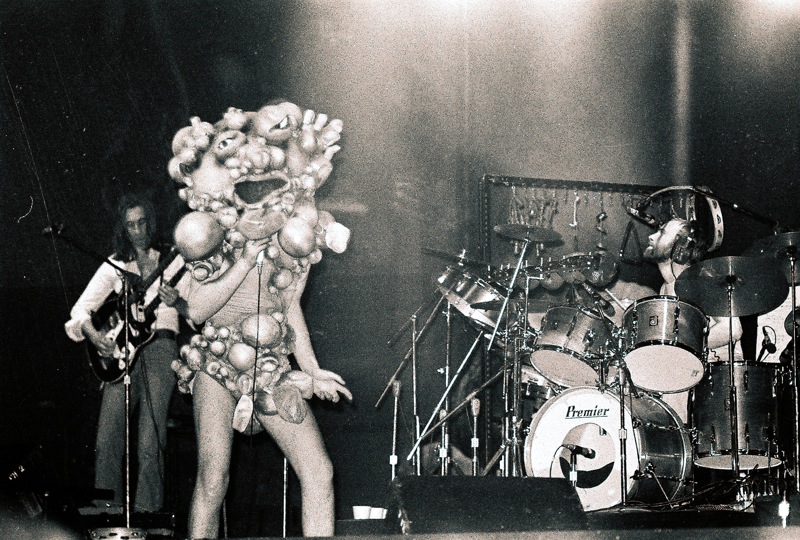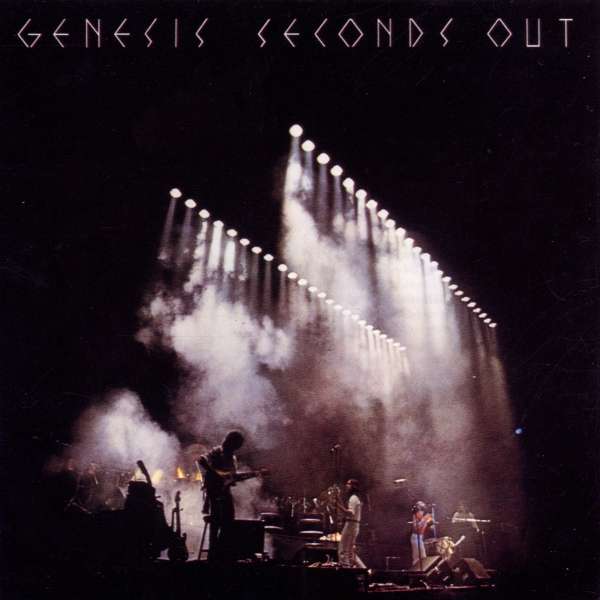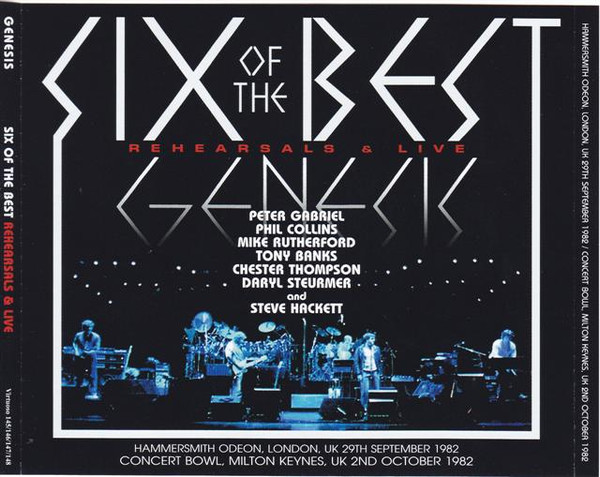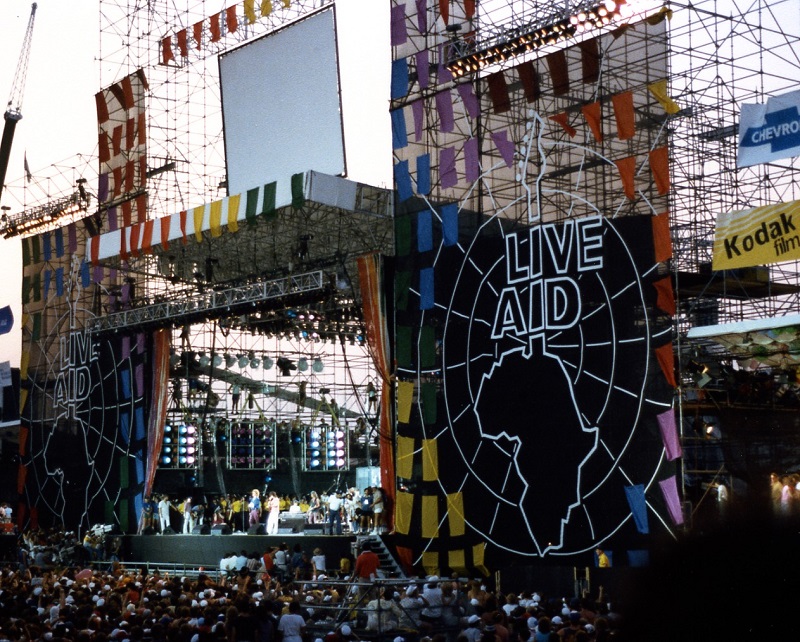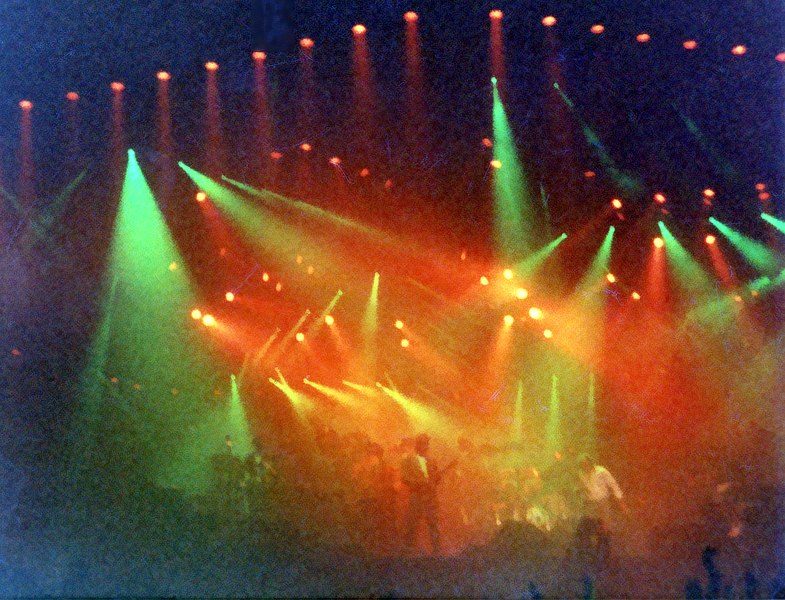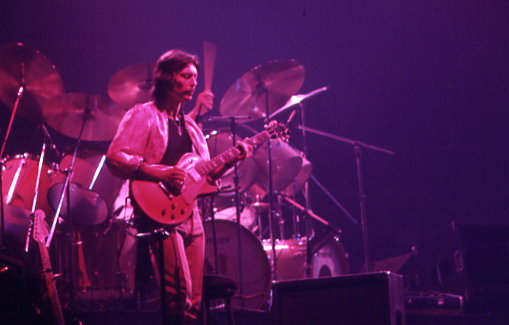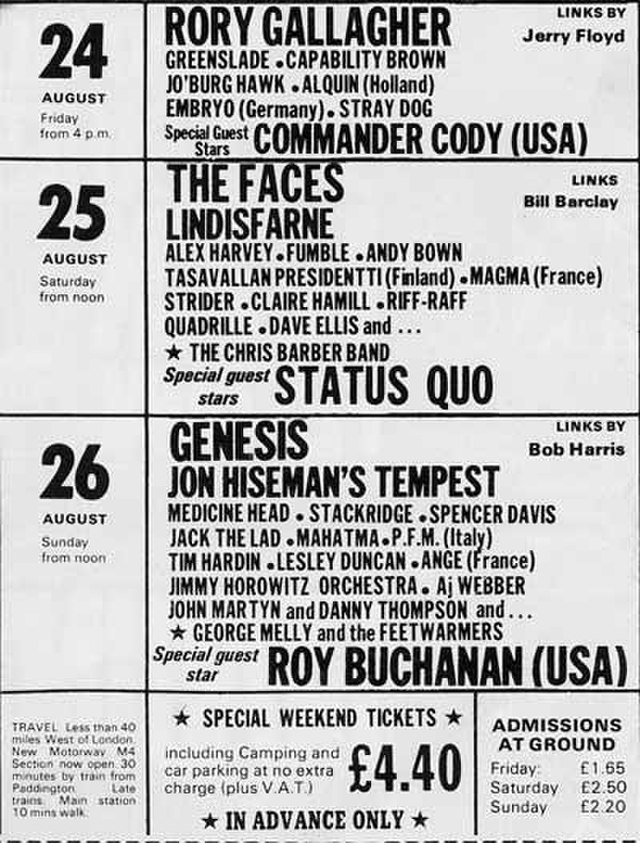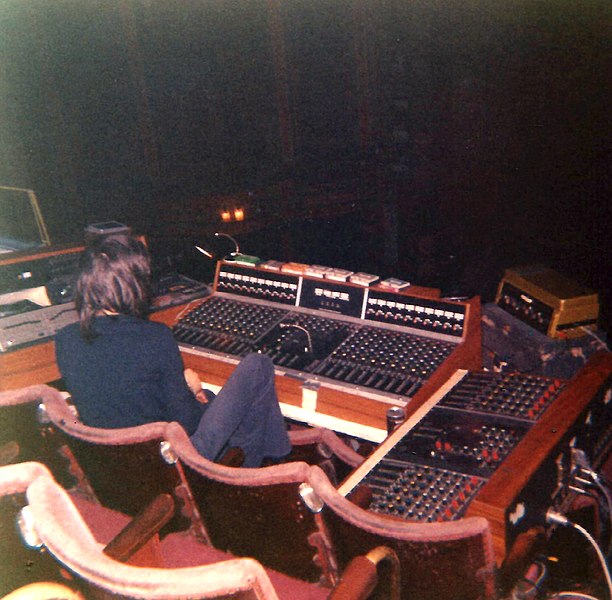Before Genesis became the iconic progressive rock band we know today, its roots lay in two school bands at Charterhouse School: Garden Wall and Anon. Among these, Anon brought together the talents of Anthony Phillips, Richard Macphail, Rivers Jobe, Rob Tyrrell, and a young Mike Rutherford. On December 16, 1965, Anon performed their first live gig—the humble beginning of a legendary musical journey.
Continue reading “The Genesis of Anon: Their First Live Gig on December 16, 1965”Phil Collins’ First Solo Concert
On November 21, 1982, Phil Collins embarked on a bold new chapter in his career: his first-ever solo concert. Held in Den Haag, Netherlands, this performance marked the start of his Hello, I Must Be Going! tour, a tour that defined his journey from Genesis drummer and vocalist to a global solo star.
Continue reading “Phil Collins’ First Solo Concert”The Lamb Lies Down on Broadway Tour: A Theatrical Odyssey (1974–1975)
As Genesis embarked on their ambitious The Lamb Lies Down on Broadway tour, which commenced on November 20, 1974, audiences were drawn into an elaborate fusion of music and visual storytelling that spanned 102 shows across the U.S., Europe, and the UK. The tour, running until May 22, 1975, was an unprecedented venture, marked by its innovation, chaos, and lasting legacy. But how did it become one of the most memorable and challenging chapters in Genesis’ history?
Continue reading “The Lamb Lies Down on Broadway Tour: A Theatrical Odyssey (1974–1975)”Seconds Out (1977) – Genesis
Genesis released their double live album Seconds Out in October 1977, capturing the band’s performance during the Wind & Wuthering tour. Recorded mainly at the Palais des Sports in Paris in June 1977, with one track from the Pavillon de Paris in June 1976, the album showcases Genesis at a pivotal moment in their evolution.
Continue reading “Seconds Out (1977) – Genesis”Six Of The Best
On October 2, 1982, the legendary ‘Six Of The Best’ reunion show with Peter Gabriel and Genesis took place at Milton Keynes.
Continue reading “Six Of The Best”Live Aid, July 13, 1985: Phil Collins Performs in Both London and Philadelphia
On July 13, 1985, Phil Collins made music history by doing something no one had ever done before (and likely hasn’t done since). He was the only performer to appear live at both Live Aid concerts, in London and Philadelphia, on the very same day.
Phil Collins: Everywhere at Once
By the mid-1980s, Phil Collins had become a global phenomenon. As both a solo artist and member of Genesis, he had racked up chart-topping albums, hit singles, and sold-out tours across the world. His third solo album, No Jacket Required, had taken 1985 by storm, dominating airwaves and topping the charts in multiple countries.
So it was only fitting that on July 13, 1985, a day described as “the greatest day in the history of pop music”, Phil Collins would also be everywhere — quite literally.
Making Rock History
Collins pulled off what seemed impossible: he performed live on global television from two different continents in a single day. And it was not for fame or headlines, it was for a cause. Live Aid, organized by Bob Geldof, aimed to raise funds for famine relief in Ethiopia. Like the Band Aid single “Do They Know It’s Christmas?” the year before, the event brought together some of the biggest names in music for one shared purpose.
While many artists participated, the day belonged to Phil Collins.
Live Aid: The Event
Live Aid was the natural successor to Band Aid. Geldof had rallied the stars once again, this time for two simultaneous mega-concerts, one at Wembley Stadium in London, the other at John F. Kennedy Stadium in Philadelphia. Almost every major pop and rock act of the 1980s took part.
Collins had previously played drums on the Band Aid single, but didn’t sing on it. His record label had advised him to hold off singing publicly, so as not to distract from the release of No Jacket Required and its upcoming tour. That changed with Live Aid.
July 13: A Day to Remember
Collins began his day at Wembley Stadium in London. In the early afternoon, under a blazing sun, he sat alone at the piano and performed “Against All Odds” and “In the Air Tonight”.
‘lt was blisteringly hot, the white stage. lt was so hot and l made a terrible mistake on ‘Against All Odds’ on the piano’, Phil later recalled. ‘l thought, ‘Oh God, what a good start for the day this is.”1
The bum note was heard not only by the 80,000 people at Wembley, but by over 1 billion viewers watching around the world.
He was then joined by his friend Sting for a duet of “Long Long Way to Go”, a track from No Jacket Required (Sting had sung backing vocals on the original), followed by a performance of “Every Breath You Take”.
From London to Philadelphia
Collins left Wembley, jumped on a Concorde, and flew across the Atlantic to perform at the Philadelphia show just a few hours later. He recreated his solo set and also played drums for both Eric Clapton and the reunited Led Zeppelin.
He arrived at JFK Stadium at around 7:00 p.m., asked Eric Clapton what they’d be playing, and by 7:30 p.m., he was onstage with him. Somewhere in between, he even found time to visit Robert Plant’s trailer for a quick chat before their Led Zeppelin set.
It was a whirlwind. But it perfectly captured the tireless energy of Phil Collins in the 1980s.
The Legacy
By 1985, Collins was already a global star. But performing at both Live Aid concerts catapulted him even further, cementing his status as a worldwide icon and consummate showman. His double appearance was not only a technical and logistical feat, but a powerful symbol of the unity and urgency behind Live Aid’s mission.
Live Aid: In Hindsight
While Live Aid is remembered for its good intentions, it’s also seen — in retrospect — as a bit of a cliché: wealthy Western musicians trying to “save” Africa with rock music. The lyrics of Do They Know It’s Christmas? have been criticized for their colonial tone and stereotypes. Still, the event did raise enormous funds and global awareness for the crisis in Ethiopia.
Phil Collins didn’t just participate in the day, he helped define the moment. His double appearance remains one of the most talked-about achievements of Live Aid, and one of the most iconic performances in rock history.
Title photo: Live Aid at JFK Stadium, Philadelphia, PA. Source: Wikimedia Commons, own work. Author: Squelle. / CC-BY-SA-2.5 (https://creativecommons.org/licenses/by/3.0).
- Phil Collins – A Life Less Ordinary (Documentary – 2002) ↩︎
The End of the Invisible Touch Tour – Wembley, July 4, 1987
On July 4, 1987, Genesis wrapped up their massive Invisible Touch tour with the fourth consecutive sold-out show at Wembley Stadium. It marked the end of a historic run for the band and a high point in their live career.
Invisible Touch: The Album
Released in 1986, Invisible Touch became Genesis’ most commercially successful album, reaching #1 in the UK and #3 in the US. It produced five major hit singles: ‘Invisible Touch’, ‘Tonight Tonight Tonight’, ‘Land of Confusion’, ‘In Too Deep’ and ‘Throwing It All Away’. Tracks like the title song, the moody Tonight, Tonight, Tonight, and Land of Confusion with its iconic Spitting Image video dominated radio, MTV, and the charts throughout 1986 and 1987. Genesis had never been more visible – or more popular.
Naturally, the band embarked on a massive world tour, playing across North America, Australia, Japan, Europe, and finally closing with four sold-out nights at Wembley, playing to nearly 300,000 people.
The Invisible Touch Tour
The tour kicked off in September 1986 in the US and included 112 shows, selling close to two million tickets. The band was joined, as usual, by drummer Chester Thompson and guitarist/bassist Daryl Stuermer.
In Australia and New Zealand, Genesis added a local four-piece string section for In Too Deep and Your Own Special Way, due to union regulations requiring them to employ local musicians.
By this point, Genesis weren’t just a hit-making machine, they were a finely-tuned live band, backed by a state-of-the-art Vari-Lite lighting system and a tight, polished setlist. While they had a vast catalogue to choose from, the shows leaned heavily on songs from Invisible Touch and recent albums.
The Setlist and Show Highlights
Every show opened with Mama, though its eerie atmosphere did not always translate well in daylight stadium settings. The closer was the now-iconic Turn It On Again medley, which featured a whirlwind of rock classics: Everybody Needs Somebody to Love, Satisfaction, Twist and Shout, Pinball Wizard, All Day and All of the Night and Karma Chameleon.
Older fan favorites included: Los Endos, Home By The Sea (with its now-standard ghost-story intro) and the In The Cage medley.
At the beginning of the tour, the In the Cage medley included In That Quiet Earth and the second half of Supper’s Ready. But as the tour progressed, Phil Collins began having trouble hitting some of the higher notes in Supper’s Ready, and the band eventually returned to the familiar In That Quiet Earth / Afterglow ending.
New material from Invisible Touch featured heavily, with standout performances of: Domino (with Phil’s now-legendary audience interaction), Tonight, Tonight, Tonight, Throwing It All Away (where the crowd singalong grew with each night) and Invisible Touch.
Live at Wembley Stadium
‘Nearly 300,000 people at Wembley. OK, there might have been a few repeats in there, but I thought at the time, and I still think now, that moment was the peak of our career’1 – Tony Banks.
By the time Genesis arrived at Wembley, the band had performed the set so often it had become a masterclass in musicianship and stagecraft. Initially, only two nights at Wembley were planned, but due to overwhelming demand, two more were added, making Genesis the first band to play four sold-out shows at Wembley Stadium. They entered the Guinness Book of Records, a record later broken by Michael Jackson during his Bad tour in 1988.
The Wembley concerts were filmed and later released on VHS and DVD (2003). Unfortunately, the epic In the Cage medley did not make it into the final release, (allegedly) due to bad luck with tape changes during that very song on each night.
Even so, the performance captured at Wembley is phenomenal, showcasing Genesis at their live peak. With Invisible Touch, the band had reached global superstardom and Wembley was the victory lap.
After this triumph, fans would have to wait four more years for the next Genesis studio album.
Title photo: Genesis Nancy 1987. Phil Collins, Tony Banks, Mike Rutherford, Daryl Stuermer, Chester Thompson. Genesis en concert à Nancy le 14 juin 1987 au stade Marcel-Picot de Nancy-Tomblaine Source: Wikimedia Commons, Fredamas / CC-BY-SA-2.5 (https://creativecommons.org/licenses/by/3.0).
- in Banks, Tony; Collins, Phil; Gabriel, Peter; Hackett, Steve; Rutherford, Mike; Dodd, Philip, Genesis. Chapter & verse. (New York: Thomas Dunne Books/St. Martin’s Griffin, 2007), p. 287. ↩︎
Steve Hackett’s Last Show with Genesis
On July 3, 1977, Genesis played the final show of their Wind & Wuthering tour, unaware that it would also be Steve Hackett’s last performance with the band.
Wind & Wuthering and Growing Tensions
Released in December 1976, Wind & Wuthering was Genesis’s second album following Peter Gabriel’s departure. With Phil Collins now stepping confidently into the role of lead vocalist, the band had successfully reinvented itself as a four-piece. Collins had already proven he could carry the frontman role with A Trick of the Tail and the subsequent 1976 tour.
By this point, songwriting duties were largely shared between Tony Banks and Mike Rutherford, while Phil focused more on arrangements and performance. Steve Hackett, however, was growing increasingly frustrated. He felt that his musical ideas were often overlooked, and after the 1977 tour, he made the decision to leave Genesis.
The Wind & Wuthering Tour
The 1977 tour was one of Genesis’s biggest yet, taking them across Europe, the US, and for the first time, South America. They were joined by American drummer Chester Thompson, who would become a fixture in the live lineup for decades.
That year, the band reached new heights in live performance and was even voted “Best Live Group” in 1977. Much of that era’s power was captured on the double live album Seconds Out.
The Final Show: July 3, 1977, Munich
Genesis closed out the tour with a concert at Munich’s Olympiahalle. They opened with Squonk, followed by One for the Vine, a Tony Banks epic from the new album. The rare track Inside and Out from the Spot the Pigeon EP was also included, having appeared on select European dates.
Highlights of the show included The Carpet Crawlers, I Know What I Like, and Supper’s Ready, songs that had evolved significantly since Gabriel’s departure. The band had also begun experimenting with medleys, a trend that continued on this tour: Dance on a Volcano merged seamlessly into Los Endos, while The Lamb Lies Down on Broadway was paired with the climactic ending of The Musical Box.
And of course, Firth of Fifth made the setlist, featuring Hackett’s iconic guitar solo. None of the fans, or even the band members, knew it would be the last time they’d see Steve Hackett perform it live with Genesis.
Steve Hackett’s Departure
Steve had already released a solo album by this point, showcasing ideas that had not made it onto Genesis records. During the four-piece era, he had pushed for a guaranteed portion of writing credits on each album, a request the others declined, committed as they were to being a fully democratic group.
In July 1977, while mixing Seconds Out, Hackett found himself exhausted by the constant repetition of songs like I Know What I Like. After months on the road and in front of crowds of 20,000 people, he began to feel creatively stifled. The challenge was gone.
So one day, he picked up the phone and called Mike Rutherford to say he was leaving. Mike, aware of Steve’s growing dissatisfaction, did not try to change his mind.
Shortly afterward, Phil Collins happened to drive past Steve near Trident Studios, where they were mixing the album. Phil invited him into the car, but Steve acted strangely, saying only, “Talk to Mike, he’ll explain,” before walking away. When Phil arrived at the studio, Mike and Tony told him Steve had officially left the band.
The Band Carries On
Genesis continued mixing Seconds Out as a trio, then returned to the studio to begin work on their next album. From this point forward, Genesis would remain a three-piece studio band, while Steve Hackett would embark on a successful solo career.
Title photo: Genesis Steve Hackett. Source: Wikimedia Commons, Jean-Luc / CC-BY-SA-2.5 (https://creativecommons.org/licenses/by/3.0). Originally posted to Flickr as Genesis.
Genesis at Reading Festival 1971
Peter Gabriel performs with a broken ankle – and Genesis gain new fans
On 26 June 1971, Genesis performed at the Reading Festival for the very first time. Back then, they were still low on the bill, sharing the lineup with artists such as Lindisfarne, Terry Reid, Renaissance and Sha Na Na. Like many festivals, it came with its share of challenges: rain, mud, and even an unexpected police squad, but Genesis had a unique complication of their own: Peter Gabriel had recently broken his ankle.
The accident at Friars Club
Just a week earlier, on 19 June, Genesis had played a show at Friars in Aylesbury. During the encore of The Knife, Gabriel, always the theatrical frontman, leapt off the stage into the crowd. Unfortunately, the audience parted rather than caught him. He hit the floor hard and fractured his ankle.
Despite the injury, the band pressed on. Gabriel famously performed at least one subsequent gig in a wheelchair at an art college in Lincoln. Richard Macphail, Genesis’s tour manager and longtime friend, recalled the chaos:
‘And it scared the pants of me, because the stage was like a traditional theatre stage that sloped towards the audience. He was wildly cavorting in this wheelchair on this stage. I thought he was going to fall off the stage and break his neck!’1
Thankfully, he did not and just a few days later, Genesis took the stage at Reading.
Reading Festival in 1971
The 11th National Jazz and Blues Festival was held in Reading for the first time in 1971. The festival had previously moved between locations including Richmond, Windsor, Sunbury, and Plumpton due to local complaints. That year, it finally found a home in Reading, taking place at the Thames-side Arena on Richfield Avenue, over 25–27 June.
The event was rebranded as the Reading Festival of Folk and Progressive Music, with a ticket for Saturday, 26 June, priced at just £1.50. Although Reading Festival is typically held in August today, it’s unclear why it took place in June that year, perhaps due to the town’s 1000th anniversary celebrations, which had helped organizer Harold Pendleton gain approval from the local council.
Sharing the stage with Charisma labelmates
Genesis were not the only Charisma Records act at Reading in 1971. Lindisfarne, Van der Graaf Generator, Bell & Arc, and Audience also performed, alongside other notable names like Arthur Brown, Rory Gallagher, Wishbone Ash, Osibisa, and Ralph McTell.
Genesis played mid-afternoon on the festival’s second day. Despite their relatively low billing, their set was highlighted as one of the standout performances of the weekend. The impact was strong enough that they were invited back in the following two years.
A new era: Genesis and the festival circuit
That summer marked the beginning of Genesis’s appearances at outdoor rock festivals. Steve Hackett later recalled that it rained nearly every time they played an outdoor show in England or Europe, turning every venue into a mud bath.
At Reading, technical issues added to the frustration. Power fluctuations made it nearly impossible to keep instruments in tune. The organ was already difficult to manage, and the Mellotron, notorious for its fragility, was even worse. Their twelve-string guitars, tuned backstage, were often already out of tune by the time they hit the stage and tuning a twelve-string in front of a festival crowd was nearly impossible.
Not made for festivals?
Looking back, Tony Banks admitted that Genesis were not ideally suited for the festival scene in those early years. The broad daylight made it difficult to create a dramatic atmosphere, the audiences did not always appreciate the complex song structures, and sound quality was often poor.
Still, the band slowly built a reputation as a strong live act and festivals helped them reach new fans. The real magic, though, happened after dark, when they could perform for their own audiences in a controlled setting.
But even at this early stage, they were beginning to leave an impression. At Reading 1971, some fans in the crowd already waved Genesis flags, signaling that the band’s dedicated following was starting to take shape.
Photo: Reading Festival Line Up 1973. Reading-festivaalin vuoden 1973 esiintyjälista Source: Wikimedia Commons, National Jazz, Blues and Rock Festival. / CC-BY-SA-2.5 (https://creativecommons.org/licenses/by/3.0).
- Platts, Robin, Genesis. Behind the lines, 1967-2007. (Burlington, Ont., Canada: Collectors Guide Pub., 2007), p. 44. ↩︎
Genesis’ First Gig Abroad: Belgium, March 7, 1971
Genesis played their first-ever overseas concert on March 7, 1971, at La Ferme in Woluwe St. Lambert, Belgium. This landmark performance marked a significant step in the band’s journey, as they ventured beyond the UK for the first time.
Trespass Had Charted in Belgium
At the start of 1971, Genesis had yet to achieve major success in their home country. However, things were different on the continent: their second album, Trespass, had reached number one in Belgium. Encouraged by this unexpected success, the band – now featuring new members Phil Collins on drums and Steve Hackett on guitar – headed to Belgium for their first international show.
A Rough Journey Across the Channel
The band crossed the English Channel on an overnight ferry, but sleep was out of the question. Unable to afford cabins, they spent the night sitting on deck – while Phil, suffering from seasickness, spent most of it throwing up. Running on little more than beer and sandwiches, they arrived in Belgium the next morning, drove straight to the venue, and played.
The Setlist: A Mix of Old and New
The setlist featured songs from Trespass, live favorites, and two brand-new tracks. As was typical for Genesis at the time, the performance started with acoustic material before building up to heavier numbers. Fortunately, a recording of this historic gig exists, allowing us to hear most of the show (though some parts are missing). It also contains the only known live recording of the rare song “The Light”, which features early elements that would later evolve into The Lamb Lies Down on Broadway’s “Lilywhite Lilith.”
Opening with a New Song
The show began with the band’s latest composition, “Happy The Man” – introduced by Peter Gabriel as a song about a man who “eats his fingernails, probably.” Built around a Mike Rutherford riff, the song had a laid-back, folk-rock feel, reminiscent of Lindisfarne. It was an attempt at a radio-friendly single, and in this live version, it was performed at a slightly slower tempo.
Next came “Stagnation” from Trespass – which Gabriel jokingly described as being about “people with bad breath.” This live rendition, enhanced by Phil Collins’ drumming, had a swing that was missing from the studio version.
The Only Recorded Performance of “The Light”
After a few minutes of Peter’s humorous attempts to introduce the band, they launched into “The Light” – a rarity in Genesis’ catalog. The song’s opening bass riff would later be repurposed for “Lilywhite Lilith”, and Steve Hackett’s guitar parts would also find their way into that track. “The Light” then developed into a full-fledged progressive rock piece, featuring an extended instrumental jam between Tony Banks and Hackett. Eventually, the song returned to a section that closely resembled the later Lamb Lies Down classic. Compared to other Genesis compositions from this era, “The Light” stands out as a unique and intriguing experiment.
A Blend of Familiar and Unfinished Material
Next, the band slowed things down with “Twilight Alehouse”, a live staple at the time. The dramatic organ-driven climax showcased Tony Banks’ signature style. Then came another brand-new song: “The Musical Box”, which Peter introduced in both English and French. This early version was slightly different from the one that would appear on Nursery Cryme later that year. There was extra instrumental material before the “And the clock” section, which was repeated twice. Tony’s keyboard solo was extended, while Steve Hackett’s was shorter – unsurprising, as he had only been with the band for two months. Even the song’s now-iconic climax had subtle differences in Gabriel’s vocal delivery.
The band then launched into the Trespass classic “The Knife”, which Peter introduced in French. Tony’s organ led the charge, Mike Rutherford’s bass provided the driving force, and Steve Hackett – though still getting to grips with the song’s solos – delivered a strong performance by the end. Unfortunately, Peter’s flute section in the middle is missing from the recording. The audience, however, responded with enthusiasm, applauding loudly.
For the encore, Genesis performed “Going Out to Get You”, an early track that Peter described as “a very old number about passion.” Tony Banks dominated the piece, and Steve Hackett was barely audible – at times, it even seemed as if he wasn’t playing at all.
A Glimpse Into Genesis’ Creative Process
Listening to this rare recording is fascinating – not just because it includes unreleased songs, but also because it captures the band in the midst of developing their material, both musically and lyrically. Most notably, it features the only known live performance of “The Light”, making it an essential piece of Genesis history.
An Exhausting but Pivotal Moment
The concert was a success and a crucial milestone for Genesis. After the show, the exhausted band made their way back to the UK on the ferry, with Phil Collins limping home, nearly collapsing from sheer fatigue. Despite the rough journey, this first step into the international spotlight marked the beginning of Genesis’ rise as one of progressive rock’s most important bands.
Photo: FOH PA mixing desk and associated gear for Genesis at a concert in the Liverpool Empire, 1970s, precise year unknown. Source: Wikimedia Commons, Rodhullandemu / CC-BY-SA-2.5 (https://creativecommons.org/licenses/by/3.0).

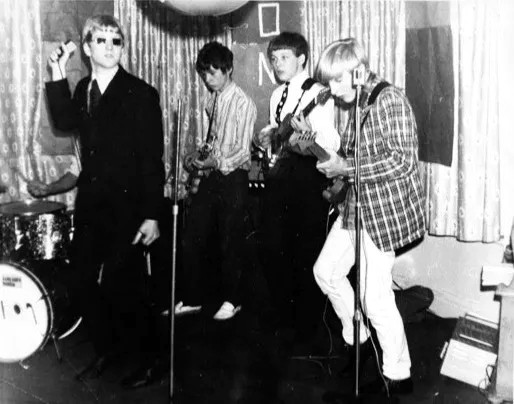
![Phil Collins on the cover of Live at Perkins Palace [1982]](https://genesis-band.com/wp-content/uploads/2024/11/Phil-Collins-on-the-cover-of-Live-at-Perkins-Palace-1982.jpg)
